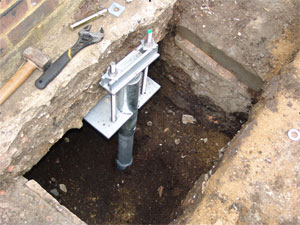
02 May How Will Underpinning Affect the Value of My Property?
When you put a property on the market, any past underpinning work is one of the things you’re legally obliged to declare. While this could, in some circumstances, have a negative effect, the picture is much more complex. It could even possibly make your home more attractive to buyers.
Why Would I Need to Have My Property Underpinned?
Underpinning is a construction method that can be used for a variety of reasons, such as strengthening the foundations of your property when adding an extra story, or when it comes to fixing problems related to subsidence.
Some of the more common causes of subsidence to your property may be due to the settlement of soft ground caused by leaking drains, pipes or from flooding, or from clay-rich soils which are prone to shrinkage after extended hot periods – more commonly found in the South East of England.
Traditionally, underpinning was a matter of excavating beneath the foundations to add extra depth and take the loads imposed from the house to a level that could adequately support that load. Nowadays, it’s much more common to use the simpler and less invasive method of mini-piling – the cost which can usually be claimed through your building insurance.
Underpinning and Property Insurance
Many believed that having your home underpinned would make it more difficult to arrange building insurance, and if you could find coverage, you would likely pay a higher premium. While there are still some insurance companies that take this attitude, things have changed considerably in the past few years.
Put simply, properties that might potentially require underpinning — whether due to flooding risk or excavations — are likely to be harder and more expensive to insure. However, insurers are increasingly realising that those properties which have been underpinned are less at risk than those which haven’t.
So, while an underpinned property might be a little more expensive to insure than one that’s never been at risk, it will almost certainly be cheaper than one left at risk.
Underpinning and Market Value
The picture is even more mixed when it comes to market value. There’s no doubt that some buyers, may be unwilling to buy an underpinned property (due to potential existing and future subsidence-related issues), but better-advised buyers will realise that the underpinning is a plus due to the extra stability and protections it can add against future subsidence.
In the end, your underpinned property’s value is likely to depend partly on the market. If buyers have a wide choice, they may prefer to steer clear of a property in an at-risk area, underpinned or not. On the other hand, in a seller’s market, having a certificate of underpinning could well make your property more attractive than others in the neighbourhood.
Quality Underpinning Is Crucial
As with other aspects of construction, it’s not enough just to have your property underpinned — it needs to be an expert job, with a ten-year defects insurance guarantee. Works should be carried out by specialist underpinning firms with a substantial track record, rather than general builders.
To find out more or enquire about potential works, contact Underpin and Makegood for advice from our specialists who can provide skilled and guaranteed underpinning works.




